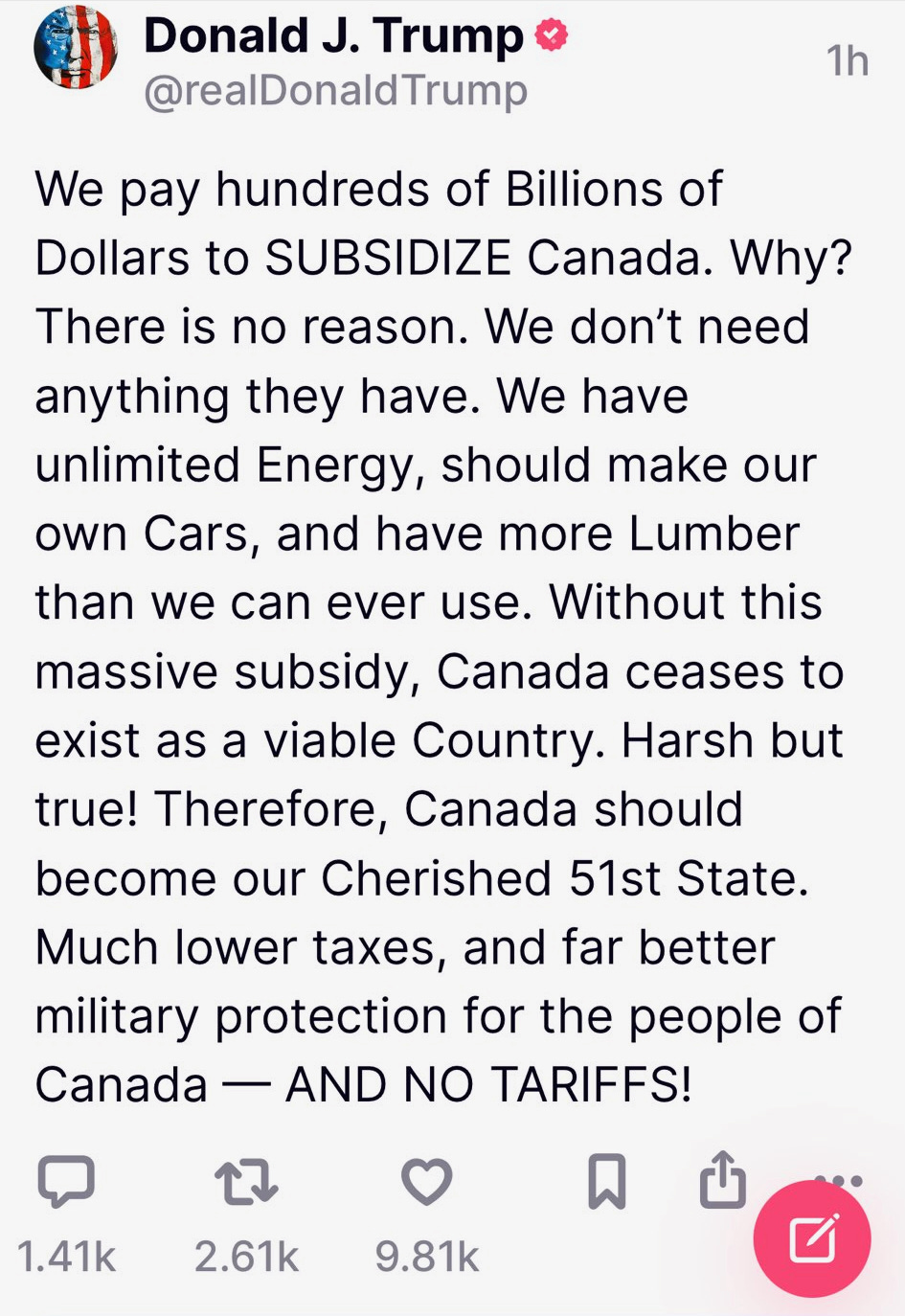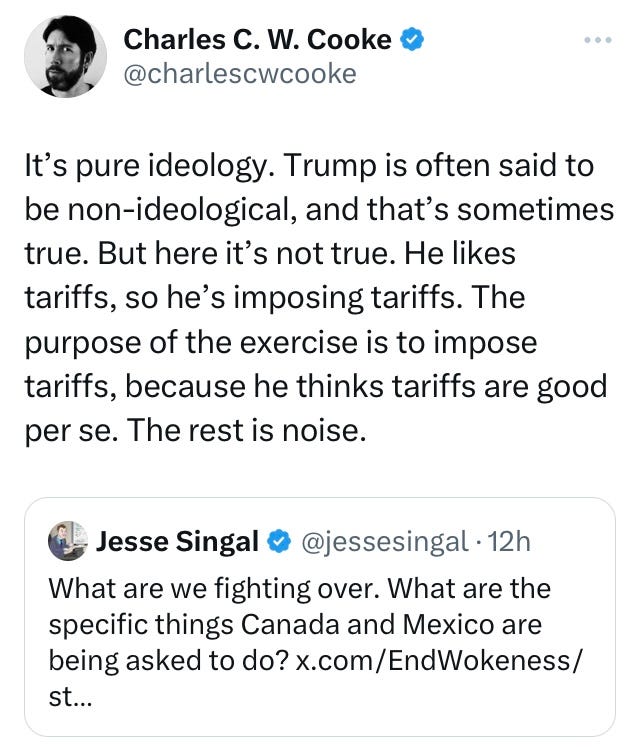Dear Friends,
That didn’t take long. In my piece entitled “Good, Bad, & Ugly” I wrote:
On the economics side, Trump has made good picks and bad picks and we shall have to wait and see. He can have deregulation and an economic boom, or he can have tariffs and the opposite. We know which one he really loves. Can his advisors keep him from ham-fisting it? Stay tuned.
Week Two Update: his advisors were unable to keep him from ham-fisting it. He announced at the end of last week tariffs will now be levied on Canada and Mexico. Of course, the tariffs are not paid by Canada or Mexico; they are paid by domestic importers of products, and then the costs are passed on to … you and me at the cash register. Tariffs are domestic tax increases.
And then, right on the heels of this announcement (and a revolt in capital markets), Trump “paused” these tariffs for 30 days to “negotiate” a deal relating to border security. This unpredictable waving around of a big stick has produced predictable reactions in our domestic political scene: Trump supporters are in awe of his prowess in getting other countries to bend to his will. Others are very unimpressed. Dominic Pino, in two paywalled posts here and here, explains that Trump hasn’t gotten anything out of this theater—indeed, he even did this exact same thing once before with Mexico, to no effect. Another downside is that such flagrant antagonism to your two neighbors destabilizes America’s relationships with all our other trade partners around the world. Trump is not exactly building trust and stability here.
For now (and clearly things can change moment by moment) Trump’s tariff defenders seem vindicated. They insisted, even in the absence of all evidence, that these tariffs were just a “negotiating” tool, “leverage” to obtain some other policy aim. I hope that is true, but I am still not quite convinced. I mean, when Donald Trump explains tariffs he rarely (never?) mentions other aims. He just really, really likes tariffs. He’s loved them his whole adult life. His worldview is a Manichaean one, a zero-sum game in which other nations are constantly “ripping off” America. Don’t take my word for it. Listen to him explain why he imposed tariffs on Canada:
We pay “hundreds of billions of dollars” to SUBSIDIZE Canada, he says. Leave aside he is talking about his own trade agreement with Canada. (!) Do you know what he is talking about when he says “subsidize”? Buying things. Oil and gas, lumber, steel, that kind of thing. I cannot stress enough how incandescently stupid it is to speak this way, so much so that I would die of sheer embarrassment if I had to defend this garbage for a living.
When I go to the grocery store and pay them $100 and come home with a bag full of food, I have not “SUBSIDIZED” WinCo to the tune of a hundred dollars, like I made some kind of charitable donation. I have made a beneficial economic transaction, both for them and for me. Donald Trump acts like “paying” Canada money is some kind of ripoff, as if we didn’t get anything in return. My favorite part is “without this massive subsidy, Canada ceases to exist as a viable country.” Well, yes, if a country is unable to sell and export things, they will not long exist. This is what is called a “truism.” But, no! There must be something nefarious going on; those [checks notes] nasty, cunning, cheating Canadians are selling us things at a price we are willing to pay! How dare they!?
Charlie Cooke has it exactly right, I think. This is the one thing about which our “non-ideological” President is actually ideological:
We’ll just have to wait thirty days to do all this over again.
The Trump Administration continues their plan of taking a wrecking ball to our institutions. Breaking things first, and sifting through the rubble appears to be the plan. This was the case with the dismantling of USAID, the agency for international development. The Dispatch’s morning newsletter, “The Morning Dispatch,” put out an extremely helpful, balanced, and well-sourced article explaining the ins and outs and why it is controversial. As Tom Hart, CEO of an organization representing 170 NGOs carrying out humanitarian aid put it: “We understand a review process. We do not understand dismantling foreign aid and then reviewing it.”
Yes, breaking things before counting the cost is not exactly a kind of “conservatism” I recognize.
Just to quickly update matters on the immigration front: I’ve mentioned my opposition to President Trump shutting down the US refugee program, and now comes the news that he is revoking the legal status of Venezuelan refugees who are already here. 350,000 of them, many of whom fled Maduro’s brutal regime, waited patiently in line, and were granted asylum.
Some of these are personal friends of mine, working and making a new life here. Revoking promises you’ve made (and already kept!) and upending the lives of real people and families is immoral and shameful.
I said there would be good, bad, and ugly, and that’s the bad and ugly—well, there’s more bad and ugly. RFK, Jr. is poised as of this writing to be confirmed at HHS, which is nothing any genuine conservative could have supported up until about five minutes ago. Well, actually, it is still true that no true conservative can support him without betraying conservatism. But in fairness, I will point out some good things. The dismantling of DEI is a really good thing; Trump’s executive orders relating to “transitioning” kids are good; and Pete Hegseth’s statement below, on “Identity” months in the military is superb. He’s a man who knows what militaries are for.
Keep reading with a 7-day free trial
Subscribe to The Square Inch to keep reading this post and get 7 days of free access to the full post archives.






